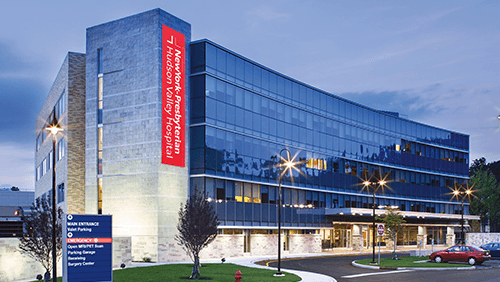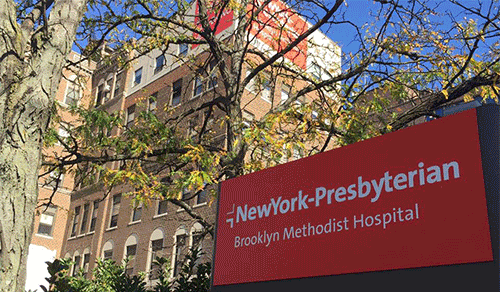The Most Advanced Therapies
Pancreatic cancer has often progressed to an advanced stage by the time it is diagnosed. Many patients come to NewYork-Presbyterian for pancreatic cancer care because of our innovative and aggressive approach. Patients who have been turned down for surgery at other centers have been successfully treated at NewYork-Presbyterian.
The care of people with pancreatic cancer is best handled by a multidisciplinary team of specialists with expertise in diagnosing and treating this disease and relieving symptoms. This is the approach we take at NewYork-Presbyterian. We offer the latest advanced endoscopic techniques, minimally invasive and complex surgical approaches, chemotherapy, and radiation therapy. We treat patients as well as their families, offering genetic counseling and testing, support groups, and nutritional guidance.
What causes pancreatic cancer?
While it is not always known what causes pancreatic cancer, common risk factors for the disease include:
- Cigarette smoking
- Chronic pancreatitis
- Diabetes
- Obesity
- Genetic (inherited) factors, such as a mutation in a BRCA gene
- Malignant transformation of pancreatic cysts
Types of pancreatic cancer
The type of pancreatic tumor you have will determine your treatment.
- Most pancreatic cancers are pancreatic adenocarcinoma
- Other tumor types include neuroendocrine tumors and islet cell cancers and other rare tumors
- Cancers arising from mucinous cysts of the pancreas
Pancreatic Cancer Signs & Symptoms
Pancreatic cancer is known as a "silent disease" because it typically does not cause symptoms until it has grown to an advanced stage. When symptoms do develop, they may include:
- Jaundice (yellowing of the skin and whites of the eyes)
- Pain and discomfort in the upper abdomen
- Digestive problems such as indigestion, nausea, weight loss, a poor appetite, and diarrhea
- Unexplained weight loss
- Fluid collecting in the belly (ascites)
- Itchy skin
- Sudden onset diabetes
Advanced Diagnostic and Staging Techniques
While your initial assessment for pancreatic cancer may include CT scanning and magnetic resonance imaging (MRI), we use more advanced tools to confirm your diagnosis and to determine its extent — a process called staging. These tools include:
- Confocal endomicroscopy. NewYork-Presbyterian is one of the few centers in the country offering confocal endomicroscopy of the pancreas, which can aid in the detection and staging of cancer. We use a small microscope to analyze cells to determine if they are normal or precancerous. Cancerous tissue may be immediately removed through an endoscope for further examination.
- Endoscopic ultrasound (EUS) involves the use of a special endoscope with high-energy sound waves ("echoendoscope") to visualize your digestive tract and nearby organs. We often use it to guide needle biopsy.
- SPYGLASS technology provides a direct view of the bile duct system, enabling our doctors to visualize lesions and narrowed areas (strictures) in the bile ducts and biopsy them to see if they are cancerous.
- Endoscopic retrograde cholangiopancreatography (ERCP) combines x-rays and the use of an endoscope. We may use it to obtain a tissue sample.
- Pancreatoscopy uses a small camera to see the pancreatic duct.
Our Approach to Care
Through a collaborative approach, our cancer surgeons, gastroenterologists, radiation oncologists, medical oncologists, award-wining nurses, and other specialists are known for providing leading medical, surgical, and supportive care for people with pancreatic cancer. They meet weekly to discuss each patient and design the optimal plan of care. We will assemble the team of healthcare professionals you need.
To support your quality of life, we offer a variety of services such as pain management, nutritional consultations, and support groups. Our nutritionists, social workers, palliative care experts, and others will help you and your loved ones address the effects of cancer and its treatment — physical, emotional, and spiritual. We understand the burden cancer can place on your life and the lives of your loved ones, and we do whatever we can to lessen that burden.
Pancreatic cancer treatment
When planning your treatment, our physicians consider the type, location, and stage of your cancer, as well as your age and physical health to personalize your treatment.
Interventional endoscopy. Using ERCP, we can open blocked ducts, drain bile ducts, and remove tissue to be biopsied. We sometimes treat pancreatic cancer by combining ERCP with:
- Radiofrequency ablation to heat and destroy cancer cells using an electric current to relieve discomfort in people with inoperable pancreatic cancer who have few other treatment options.
- Insertion of a stent to open a narrowed bile duct in patients with advanced pancreatic cancer.
- Other minimally invasive treatments include celiac plexus neurolysis to relieve abdominal pain and stent insertion to treat obstructions in the small intestine.
Pancreatic cancer surgery. You might have the Whipple procedure (removal of the head of the pancreas, part of the small intestine, the gallbladder, part of the stomach, and lymph nodes near the head of the pancreas), a complex surgery best handled by a team with extensive experience. NewYork-Presbyterian’s pancreatic surgeons are among the most experienced in the world performing the Whipple approach. Some people have just the pancreas removed (total pancreatectomy), just the tail and body of the pancreas (distal pancreatectomy), or only the body of the pancreas (central pancreatectomy).
Chemotherapy and radiation therapy. In some patients, surgery is not possible because the pancreatic cancer has grown around vital structures, such as blood vessels. If your cancer is inoperable, you may benefit from chemotherapy (such as the drugs gemcitabine and erlotinib) and radiation therapy. Some patients receive these treatments after surgery to delay or reduce the risk of cancer recurrence. Chemotherapy and radiation therapy can sometimes shrink an inoperable tumor enough to make it surgically removable. NewYork-Presbyterian has a long track record of treating patients whose cancers have been considered inoperable at other centers.
Why Choose Us
NewYork-Presbyterian is home to two of the world’s most accomplished pancreatic programs: the Pancreas Center at NewYork-Presbyterian/Columbia University Irving Medical Center and the Pancreas Program in the Center for Advanced Digestive Care at NewYork-Presbyterian/Weill Cornell Medical Center. Both programs feature multidisciplinary teams of pancreatic cancer experts, provide comprehensive care for every stage of the disease, and are among the handful of programs in the nation designated as National Pancreas Foundation Centers for the treatment and care of patients with pancreatic cancer. We have published exceptional survival rates for locally advanced pancreatic cancer. Our teams are also conducting clinical trials of promising new therapies to extend the lives of people with pancreatic cancer and to provide hope to individuals suffering from this disease. We also offer genetic counseling and surveillance through dedicated early detection and prevention programs for people at risk of pancreatic cancer due to their family history or pancreatic cysts. Call us to learn more about how we can help you.












